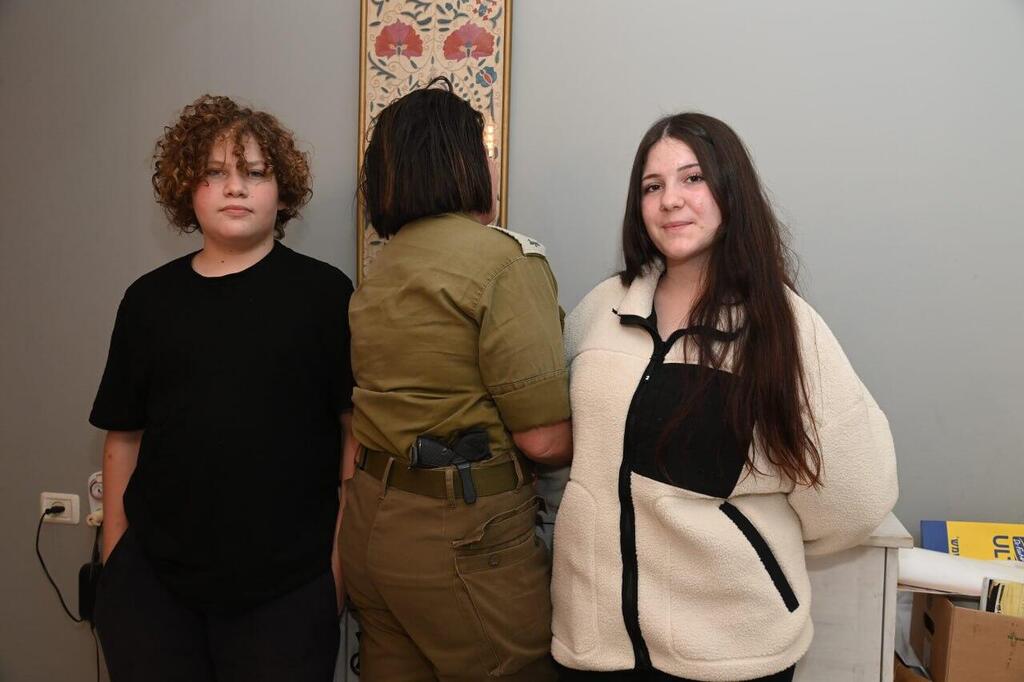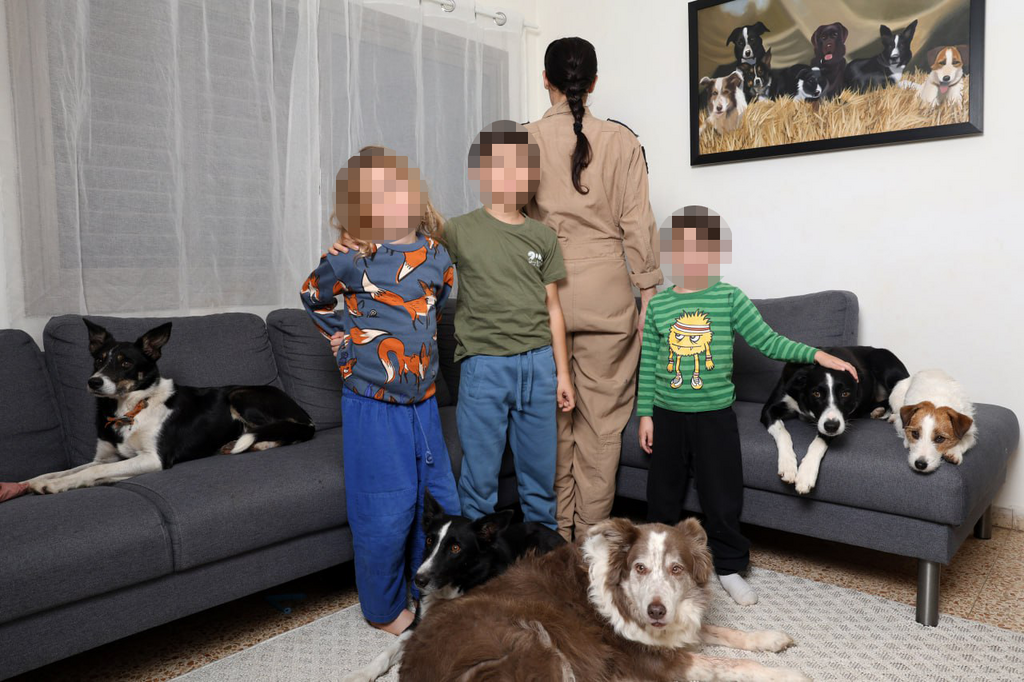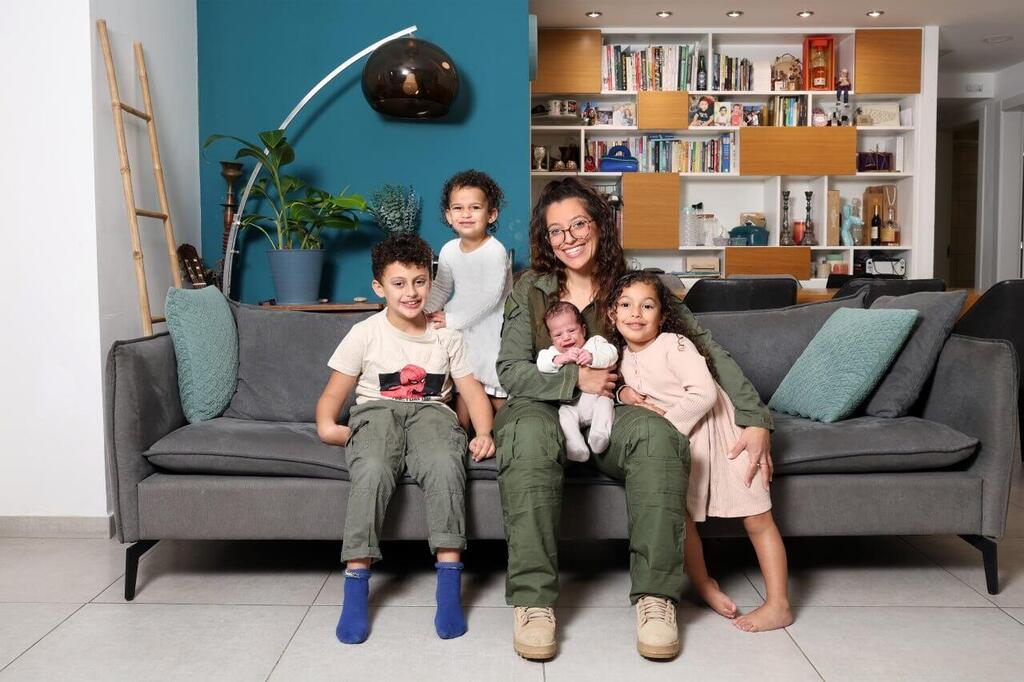Major (res.) S., who serves in a classified position, cannot tell her children why she disappears for an extended period of time. Major (res.) Noa Tom's children think their mother is "on vacation in the army," when she sleeps in a tent for months.
Yiftah, Eti, and Negev love their grandparents very much, but there is no substitute for their mother, Major (res.) A., and father, Major (res.) Assaf who were drafted into the reserves when the war broke out. First Master Sergeant (res.) Tzlil Fadael, who was exempted from reserves as a mother of three children, fought to enlist in the war during which she gave birth to her fourth child, Ilai.
The women who gave the country so much share the difficulties of long reserve service, the support they receive at home, and their surroundings that did not always look favorably on their reserve service.
Major (res.) S. and her children Koren, 15 and Inbar, 13 from Ein HaBesor
S. 44, who serves as an operations officer in a classified unit, has already completed more than 300 days in the reserves since October 7. As soon as she landed in Israel on October 7 from a vacation abroad, she drove from the airport to Ofakim and joined the efforts at a Magen David Adom station. Throughout her flight until Sunday night, her children Koren and Inbar were besieged in their father's home in Ein HaBesor.
"Just before we took off, they managed to tell me that they heard gunshots and shouting in Arabic outside the window," she said. "I asked them to hide. I was completely helpless. As far as I was concerned, I wouldn't have children when I landed."
After a sleepless night in an ambulance, between evacuating the wounded and providing treatment on the ground, S. went to meet her rescued children. "It was a great relief, I could breathe again," she says. Since then, the two haven't gotten to see their mother much, as she travels between bases across the country. "I'm doing something big, but I can't share anything with them, it's a bit of a challenge," she adds.
Koren shares that she misses her mother especially when she started in the new school in Tel Aviv to which they were evacuated, or during her 15th birthday. "When she comes back, I filter out some of the things not to burden her, she's busy enough," Koren says. Inbar admits that he occasionally gets annoyed when he can't reach his mother on the phone, but reminds her that "she's doing something important and will get back to me." Koren identifies with the feelings: "Mom helps make a better future for the country."
In the meantime, the family helps as much as possible, including grandparents who were evacuated from Kibbutz Magen. "When reservists ask me, 'Who's with the kids at home?', I ask them who's with their kids. Works every time," S. concludes.
Major (res.) Noa Tom and her children Gali, 8, Omer, 5, and Yuval, 2.5 from Zikhron Ya'akov
"I have been serving in the reserves for 20 years, I was also called up in the Second Lebanon War," says Major Noa Tom, 41, a training officer in the 55th Division. "The children are used to seeing their mother in uniform, but not with this intensity. Now it's really like I'm back in service."
For more than a year, she has accompanied the forces, moving between the Gaza Strip and Lebanon, sleeping in a tent for months. "The division is made up mainly of men, from the soldier to the division commander," she says, "I am usually the only woman in the room." Then she adds, "I would like to live in a world where there is no need to make articles about mothers in the reserves, it would be obvious that both mother and father work, raise children, and serve in the reserves. This way, they'll stop telling my husband, 'Great job with the kids,' and telling me, 'Thank you for your service.'"
On October 7, Noa packed a bag, said goodbye to her husband and children, and left for the unit. "They're lucky because dad is softer than mom, he's the best," she says humorously. Since then, every time she packs a bag and takes her weapon, "the kids understand that my time at home is over and I'm going back to the army. There is a lot of crying so I calm them down and promise to come back."
Five-year-old Omer says that she is "on vacation in the army." Eight-year-old Gali says, "Mom teaches the soldiers to fight. When Mom is away, I miss her very much and am afraid that something will happen to her, that she will be hit by a missile. I miss her every night when I want her to kiss me goodnight." Omer adds, "It's also fun with Dad, who takes us to the playground a lot."
Major (res.) A. and her children Yiftah, 9, Eti, 7, and Negev, 5, from a moshav in central Israel
When the war broke out, A. and her husband, Major (res.) Assaf, put on uniforms. She is a flight controller in the Air Force and he is a combat soldier. They left their three children and five dogs at home in a moshav in central Israel. "Thank God there are grandparents," says A. and proudly describes her work: "I am responsible for managing Israel's airspace. I am 24/7 on alert, identifying threats in the area and building an aerial assessment."
Due to her role, she is also responsible for coordinating ground forces. "I knew where my husband was at all times," she says. "On the one hand, I had to stay focused on the mission, on the other hand, I was afraid when he was in the field. In any unusual event or evacuation of wounded soldiers, I had to disconnect my emotions."
A. says that the most significant challenge is the transitions. "From dealing with human lives and missions of national importance, I go back to a pile of laundry and grocery shopping." She also hasn't forgotten the criticism she received in the first months of the war, saying that it doesn't make sense for children to grow up with grandparents. "My mother is in the children's school WhatsApp groups," A. says, "When I come home, she makes sure I know what to send to school with them."
Nine-year-old Yiftah says, "Mom tells the planes where to fly and dad is fighting in Gaza. In one moment, both my parents went from their jobs to the army and have been in the reserves ever since. It's hard because they're not with me, or they come for a while. In the meantime, I'm with my grandparents, whom I love very much, but they can't replace my parents. I'm waiting for the war to end and for us to go back to being a family like we were before."
First Master Sergeant (res.) Tzlil Padael and her children Imri, 7, Lishai, 3.5, Ofri, 2, and Ilai (5 weeks old) from Pardesiya
Before October 7, Tzlil was exempt from reserve service as a mother of three children. "I quickly started looking for a way to return to service," she says, "there was no question at all."
Since she was assigned a position, she has been serving as an adjutant of the Be'eri Battalion. "The battalion, which was established after the outbreak of the war, is made up of former combat soldiers from special units who have reached the exemption age," she says, "They are 40 and older, parents of children, senior managers who could not stand by. They are fighting in Rafah and the Netzarim corridor."
Tzlil, 36, says "My husband goes around saying that he is the wife of a reservist. Basically, he raised three small children alone." A month after starting her service, Tzlil discovered that she was pregnant. "It was hard for Itamar that I insisted on continuing, but he quickly realized that there was no way I would stop," she adds, "Until the seventh month, when my belly started to stick out, no one even noticed the pregnancy."
On the morning of November 5, she was taken to Hadassah Ein Kerem. After 40 minutes in the delivery room, Ilai was born. "The first person to know that I had given birth was my commander," Tzlil says. "When I was discharged from the hospital, I went straight to the base to make sure everything was okay."
Get the Ynetnews app on your smartphone: Google Play: https://bit.ly/4eJ37pE | Apple App Store: https://bit.ly/3ZL7iNv
She plans to cut her maternity leave, which is supposed to end in February. She now voluntarily travels to her base three times a week to visit. "At first, they thought it was a gimmick," Tzlil says, "that I would want to go back to the children at home very soon. I received a lot of comments. At first, I would argue, but today people have stopped commenting. My place, even among the soldiers, is clear."
Seven-year-old Imri says "There is no other child in my class whose mother is in the reserves, but my friends' fathers go to the army. Mom is going to the army so there will be someone to take care of us. Mom is fighting bad people, along with my uncle Gidi. I'm glad she's there, even though I miss her and she doesn't always answer me when I ask her when she's coming back. But I trust her to do her best."






